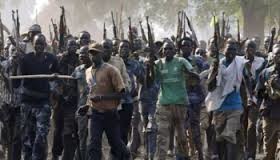Community leaders and local authorities in Eastern Nile state said up to 11 people have been killed and 57 others sustained injuries when gunmen raided a village last week.
Juac Dhieu Dok, one of the survivors claimed he survived because he had hidden himself in the Luak (grass thatched hut) after noticing that the attackers were not members of the SPLA forces.
“Initially, we mistook them for army personnel on routine patrol but when they started shooting at random and people ran out of homes and fled into different directions. Unfortunately, we could not call the headquarters of the county commissioner because there was no telecommunication service,” said Dhieu who spoke to Radiotamazuj from Melut. He claimed his wife and a mother are still missing.
Deng Jok another survivor claimed they were scared of reaching a check-point close to the Road from the side the attackers came for fear of the security operatives mistaking them for the insurgents.
“The idea of going to the security men at the checkpoint occurred to us but we were scared of being mistaken for the attackers and may be shot by the security men. So, we stayed back at our hide-outs,”
He said he did not initially know where his wife had fled or got killed until she later came after one day saying she had hidden herself in the farm and covered herself with clothes, refusing to come even when some people from the same village came out of hiding at the demands of the local youth.
“My wife is now here in Melut with me. I could not believe she was still alive but thanks God she is here now. She didn’t believe that the local youth urging her to come out of her hiding place were there to help, suspecting at first that they were the same attackers pretending to be the local youth.“How do I know that they were the local youth”, Jok said of his wife. I was just wondering whether to come out or not,” he further quoted the wife. Many did, he claimed, whereupon the gunmen started shooting them.
Chol Thon Balok, governor of Eastern Nile in an interview with radiotamazuj on Monday confirmed that the attack to have taken place and said he was “deeply saddened by the immense and tragic loss of life caused by the attack”. The governor said he had sent “a message of assurances of his support and closeness to the families of the victims and to all other South Sudanese at this painful time,”
“In union with all the people and family members of those who have lost their dear ones during these trying moments in the history of our country and condemns this act of senseless act and brutality”.
The attack, according to governor Chol, took place at Rom village on 8th Oct, some 35 kilometers North of Melut town and only about 2km from one of the oil fields in the area.
“The reports I have received so far shows that 11 people, all of them civilians have lost their lives and over 57 other civilians were wounded. Women and children were among the victims. The attackers burned down the village after they attacked it and killed over 130 goats and cheeps and looted properties before returned to where they came. They were sighted coming and returning to West Bank of the Nile. Informed my counterpart there and the SPLA command in the area”, said governor Chol.
Several local officials and community leaders also confirmed that the incident had occurred. The incident, according to one of the community leader who called for calm was unfortunate. Lual Chol claimed Rom is one of the villages inside a territory in Eastern Nile State under Melut County.
Lual claimed the attackers could be armed youth loyal to the former agriculture minister, Lam Akol, who resigned from his position in the transitional government of national unity and formed a new rebel movement to wage a war against the government of President Salva Kiir whom he accused of dictatorial tendencies and creating a situation promoting ethnic hegemony at the expense of other tribes.




